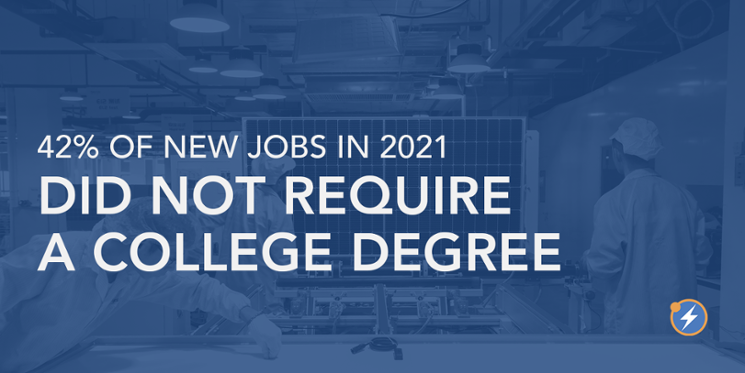
Thanks to the Infrastructure Investment and Jobs Act (IIJA) and Inflation Reduction Act (IRA), the advanced energy industry is about to take off. With the stage set for rapid industry expansion, it’s vital to know what jobs will become available and who will have access to them. Thanks to a new analysis of jobs advertised and filled in the past year and a half, we now know, at a granular level, that advanced energy growth offers job opportunities for workers with many different backgrounds – but could pose a challenge in filling the jobs needed to fulfill that growth.
AEE partnered with The Burning Glass Institute, a nonprofit labor market research center, for an in-depth look at in-demand occupations in the advanced energy industry. In the resulting report, Job Opportunities in Advanced Energy: High-Growth Occupations for Workers of All Backgrounds, we found, first of all, that demand for workers in advanced energy is accelerating, even before the IIJA and IRA kick in.
Online job postings across the advanced energy industry grew almost twice as fast as all job postings nationally the first eight months of 2022 compared to the same period in 2021 (46% versus 27%). This marked a big jump from 2021, when advanced energy job postings grew 26% compared to 21% for all postings nationally.
Job posting data also provide detailed insight into what openings for specific occupations advanced energy employers are looking to fill, and what qualifications are needed to land those jobs. Applying the distribution of occupations represented in job postings to the 120,000 jobs created nationally in key industry segments from 2020 to 2021, as the industry emerged from the COVID-related downturn, yielded even more good news about advanced energy job opportunities:
- Nearly half of all new advanced energy jobs created in 2021 were divided between two large occupational categories, one white-collar and the other blue-collar: Engineering and IT Professionals (26%) and Installation/Repair/Construction (22%).
- Advanced energy is creating good jobs that don’t require a college degree. Fully 42% of new jobs created in 2021 by the industry segments we examined – over 50,000 total – required less than a bachelor’s (BA) degree, most with median salaries above the 2021 national median of $45,760.
- The share of sub-BA jobs varied significantly, from 60% of new jobs in Distributed Solar to 12% in Grid Technology. Energy Efficiency, reflecting both its large size and large share of sub-BA job opportunities, generated over half of all new jobs for those with less than a bachelor’s degree (29,500). The Electric Vehicle segment was second in total sub-BA job creation (8,300), followed by Distributed Solar (7,800).
- The top two jobs not requiring a BA degree varied by segment:
- Distributed Solar: Sales Representative and Solar PV Installer
- Energy Efficiency: Building Automation Specialist and HVAC Mechanic
- Electric Vehicles: Automotive Service Technician and Customer Service Representative
- Large Scale Renewables: Wind Turbine Service Technician and Maintenance and Repair Worker
- Energy Storage: Team Assembler and Warehouse Worker.
For those with a college degree, the greatest number of jobs were divided between technical occupations, such as engineers and IT professionals, and sales. The sales positions requiring a college degree generally involved complex business-to-business transactions in segments such as Large Scale Renewables or Grid Technology, whereas consumer sales jobs in Distributed Solar generally don’t require a BA.
But the most in-demand professional job in advanced energy in 2021 was Software Developer (6,250 new jobs); it also boasts the highest median salary for non-managers. This reflects the increasing technical sophistication of products and services provided by the industry, but it also puts advanced energy in direct competition with the broad technology industry for software talent.
The other notable fact across the high-growth professional positions in advanced energy is the high degree of cross-fertilization between technical skills and business skills. Nearly half of management and fully half of non-technical professional jobs require engineering or IT knowledge, and a small but significant share (9% of management, 13% other non-technical professions) require both sets of technical skills. At the same time, half or more of engineering and IT technical jobs also call for business skills.
This analysis makes clear that advanced energy offers a wide variety of in-demand positions by which individuals of many backgrounds can gain from the industry’s growth, with or without technical training or experience. But it also indicates a need for attention from policymakers and industry leaders alike to ensure that the workforce will be available to fill these positions, and to ensure equitable access to the varying qualifications these positions demand.
What will be needed is expanded vocational training capacity in post-secondary technical schools and community colleges, as well as company-based internships and apprenticeships. A particular challenge will be the training of electricians, which requires a four-year union- or company-based apprenticeship. Also, state university systems, which typically include economic development as part of their missions, will need to rethink the design of their professional-track programs to produce graduates with the combination of business, engineering, and information technology skills typical of the professional occupations in advanced energy that are in high demand.
New programs that include some training as well as incentives for domestic production and apprentice labor provided by the IIJA and IRA are all important steps toward providing economic opportunity on an equitable basis. But with advanced energy employers routinely reporting a high level of difficulty in filling positions today – in 2021, 40% nationally said hiring was “very difficult” – meeting workforce needs will become more pressing as the advanced energy industry grows in response to this historic federal commitment.
